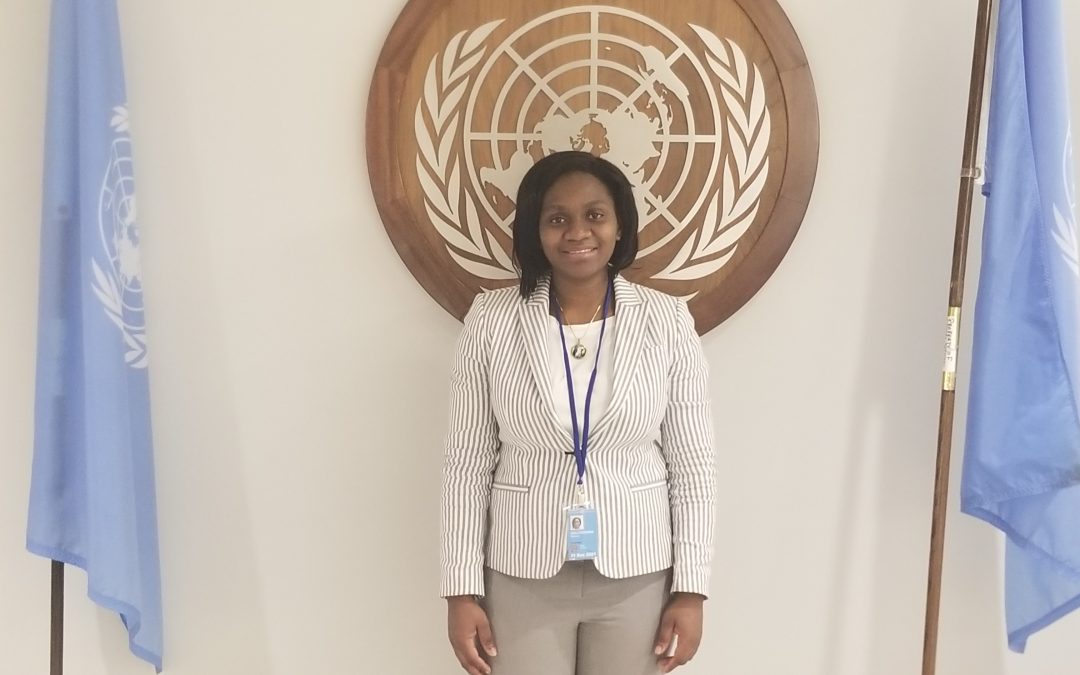
by Alondra Duncan-Belford | Jan 27, 2022 | Graduate Students, Internship Experiences
My name is Onyinye Bridget Ogili-Foreman and I am a second-year graduate student at The School of Diplomacy and International Relations. I worked as a Civil Affairs Officer intern at the United Nations Department of Peacekeeping Operations (UNDPKO) at the UN Headquarters in New York City. I always aspired to work with the UN because I have a passion for its duties, especially in areas of international security and peacekeeping in high-conflict regions. I became especially interested in the UN after taking courses that exposed me to the workings of the UN and its inherent role in international affairs.
My responsibilities included providing research assistance for policy documents and evaluating reports involving the work of different missions in the field. I also had the opportunity to work with U.N. experts to actually create policy documents. These documents will later be used in the policy prescriptions related to U.N. peacekeeping.
My internship is directly related to my coursework at the School of Diplomacy through the goals of the U.N. The goal of the U.N. is to promote diplomatic engagements between countries and create opportunities for them to find common ground on many issues that benefit from multilateral efforts. Many of the assignments I was given at the internship came naturally to me due to my previous coursework. Learning theories regarding international security and the roles of international organizations gave me material knowledge on most of the work and activities that I had the opportunity to engage in. I gained firsthand experience on how policy documents are drafted, as well as the consultation and negotiation processes needed, all of which sharpened my research, writing and analytical skills.
This internship reinforced my ambition to pursue a career with the UN and other opportunities linked to international security both in the private and public sector. My initial challenge was adjusting to work with a group of expert professionals who are more advanced both in education and experience, but I quickly learned to be humble and to ask questions. One of the most rewarding experiences was interacting with different stakeholders where I learned the nitty-gritty of the peacekeeping work. My greatest achievement has been helping to complete the work that would improve protection and safety of civilians in conflict. The satisfaction of knowing that the guidance we developed could be saving lives is truly refreshing.
My biggest take away from this internship is learning how to work with others, how to treat and respect people’s opinions and to seek to listen more. I believe these skills are going to be incredibly useful for me as a future diplomat that will be interacting with people of diverse backgrounds. I certainly recommend this internship for my fellow students as it will broaden your horizon and positively impact your personality.
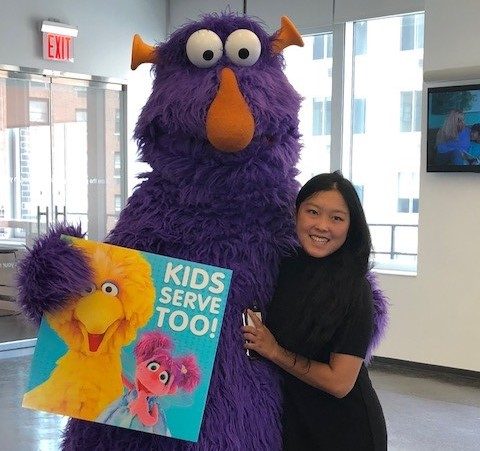
by Madison McHugh | Aug 20, 2018 | Internship Experiences, Undergraduate Students
My name is Kylie, and I am a senior Diplomacy and Modern Language major with a minor in Economics. I interned in Sesame Workshop’s Philanthropic Development Department. Sesame Workshop is the umbrella nonprofit educational organization that produces Sesame Street, which is far more than just the show. The organization works in 150 countries and has initiatives that range from dealing with grief for families of military personnel in the US to performing outreach for those affected by HIV in South Africa. I was drawn to this internship by Sesame’s creative approach to tackling difficult community issues worldwide, and I wanted to pursue my interest in education at a large organization.
My responsibilities included research, filing, inventory, team meetings, and mail management. Although the work wasn’t always glamorous, Sesame interacts with incredible people and entities, from Priscilla Chan to the Canadian government, which allowed me many opportunities to network. I also completed two major projects during my time at Sesame: the first was completing research for Sesame’s 50th anniversary next year, and the second was labeling production documents and plans from the Bangladeshi program’s ninth season production and education initiative. These projects allowed me to embrace the “insider’s view” and appreciate the kind of attention that goes into various initiatives.
Interning at Sesame showed me that nonprofits in education are an exceptional pathway to making a difference, even if it is not as flashy as counterterrorism or cybersecurity. In addition, I realized the intersection of elementary education and diplomacy as Sesame’s programs seek to simplify universal values and international issues to a level that children can internalize. Their goal is not to teach the statistics and policy, but to teach understanding and acceptance. They are instilling habits for children that lead to better lifestyles. It’s not just about learning the alphabet and numbers, but learning about the respect needed to heal divides in the ethnically and religiously diverse streets of Isreal (Rechov Sumsum) or to empower girls in Nigeria (Sesame Square). Many children in countries that Sesame Street airs in obtain their primary education through the show due to conflict, poverty, or the lack of a school system.
My time at Sesame was an amazing experience that taught me the dynamics of how large offices work and the responsibilities of various departments. As an intern, I completed informational interviews with department heads, and my last semester project included researching part of the department to make suggestions on improvements or initiatives. My project on the Yellow Feather Fund included marketing and development strategies to increase the reach of the fund, and this allowed me to explore business ideas outside of my field of interest.
Overall, I would recommend this internship or any other internship within Sesame, as the office is a welcoming environment and one dedicated not only to educating the public but enriching its interns with new experiences and ideas.
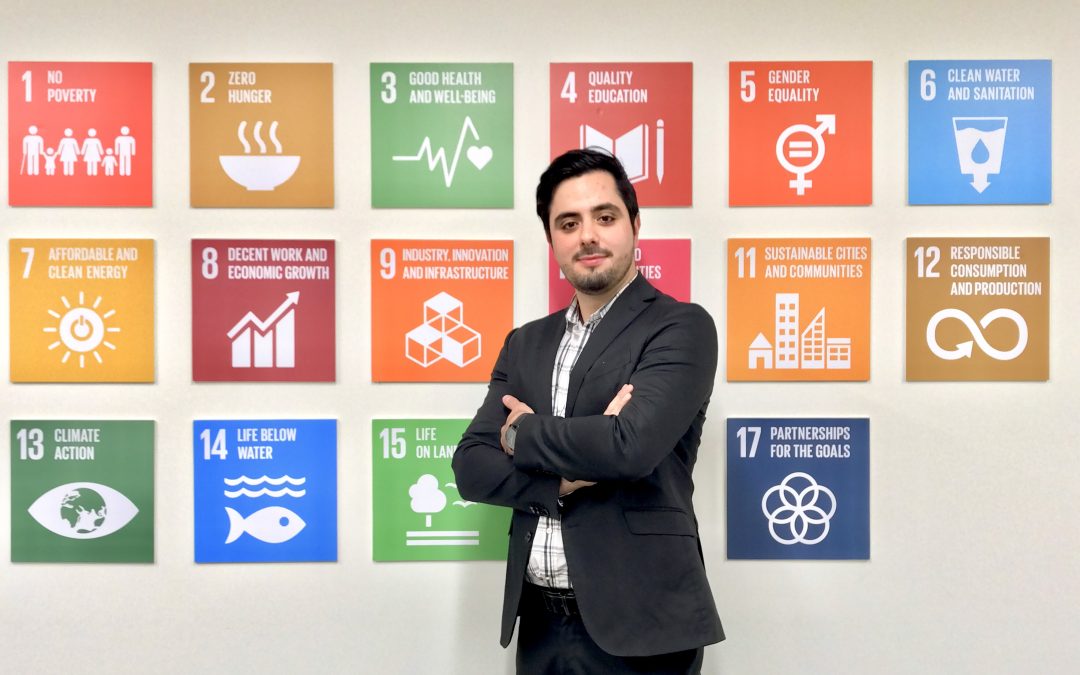
by Madison McHugh | May 18, 2018 | Internship Experiences, Undergraduate Students
My name is Ahmet Yoruklu, and I am a senior studying Diplomacy and International Relations with a double major in Economics and a minor in Russian. I am currently interning at the world’s largest corporate sustainability initiative, the United Nations Global Compact, whose mission is to mobilize a global movement of sustainable companies and stakeholders to create the world we want. Since I have been interested in multi-stakeholder collaboration between the private and non-business sector for development and sustainability across the world, I can’t think of a better fit for my personal development in this space.
As I work on the Client Engagement team here at the UN Global Compact, I get to interact with our business participants on various topics; from communication on annual progress reports to post-event follow-up campaigns. In addition, I conduct rigorous research on prospective participants and assist my supervisor in executing recruitment procedures efficiently.
What I enjoy the most about my internship is that I have the privilege of learning about the world’s largest companies and MNC’s as part of my work. It is an outstanding experience to witness how businesses align their operations and business strategies with global goals for a more sustainable world. Moreover, the opportunity to attend flagship events on different themes, such as the Commission on the Status of Women as well as the SDG Business Forum during my internship period at the UN Headquarters is certainly an invaluable experience.
When it comes to my studies at Seton Hall, what I do here on the Client Engagement team is very much related to Diplomacy and International Relations as well as Economics. Since we are a multi-stakeholder organization, we communicate with numerous entities from all over the world which requires a certain knowledge of diplomatic language and cultural awareness. In terms of diplomacy, I am certainly reaping the rewards of what I have learned studying diplomacy as I execute on my tasks, whether writing a report or utilizing critical and rational approaches during decision-making processes. Combining my knowledge of diplomacy with economics has created the best foundation for me to understand why for-profit entities take certain actions in the global economy and how I can come up with innovative ideas and solutions to achieve our agenda at the UN Global Compact. Both diplomacy and economics prepared me to be more resourceful when it comes to communicating with private sector companies and engaging them with our organization.
As I gain new experiences with this internship, it has helped me become more realistic about my career goals in terms of what path to follow in the near future. Through the experiences I add to my skillset, such as CRM management, strategic partnerships, and corporate communications, I am becoming more prepared than ever to pursue my goals in the sustainability space.
I would definitely recommend this internship opportunity to anyone who would like to gain hands-on experience in private and non-profit sector collaboration. The UN Global Compact provides an outstanding environment for those who are passionate about fulfilling global goals via local business in every part of the world – from the center of the world, New York City.
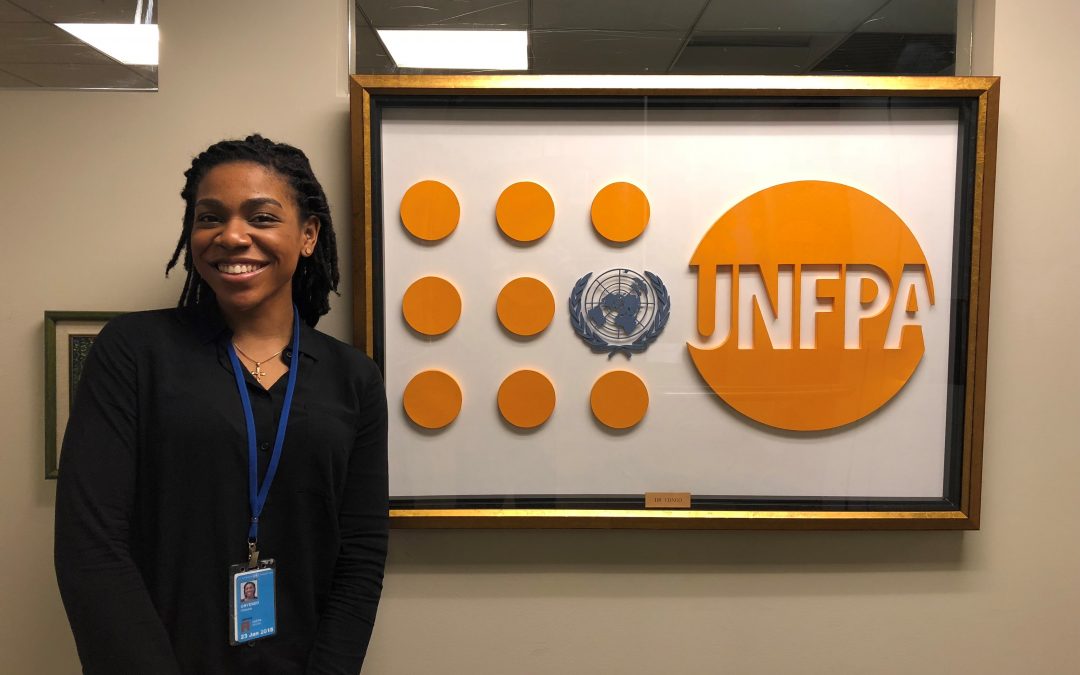
by Madison McHugh | Feb 7, 2018 | Graduate Students, Internship Experiences
My name is Chiazam Onyenso, and in my final semester within the Master of Arts program in International Relations and Diplomacy, multiple experiences have driven my current desire to continue my academic pursuits as they pertain to international affairs. My interest in collaborative international agencies reflects the internship I’ve committed myself to at the United Nations Population Fund.
My first-year M.A. studies mainly observed the nature of conflict, theories on the correspondence of the international community, resolutions and the management of international institutions that all catalyzed my eagerness to work for the United Nations. As a humanitarian information management intern for its Humanitarian and Fragile Contexts Branch (HFCB), working with the United Nations Population Fund (UNFPA) provided me with relevant knowledge on the effects of crises and the various avenues utilized by UN agencies to provide relief to affected populations and to address critical international issues. I developed exceptional skills in internal correspondence, analyzing and visualizing data, and reporting on fast-paced crisis situations in real-time. My assignments required background knowledge on humanitarian crises along with nurturing a strong understanding of UNFPA’s gender-based violence and health services for youth and women in conflict.
My experience as a UNFPA intern made me increasingly interested in staying with agency, in order to continue learning more on how it functions to fulfill its mandate and begin my career. Since last July, I have assisted HFCB in creating fact sheets, developing situation reports and analyzing information that will gradually populate UNFPA’s newly launched data portal, and the upcoming Humanitarian Action Overview for 2018. At the UNFPA, my work has been greatly complemented by the skills and knowledge I’ve procured through my master studies. Specializing in International Organizations, Global Negotiation and Conflict Management, while also earning a certificate in Post-Conflict Reconstruction and Sustainability has contributed to my understanding of UNFPA’s role and overall humanitarian response. Most of all, I’ve recognized the most crucial capacities of international assistance and aid rely on sound international law.
I hope to broaden my experience in international relations in line with international law. Adequate response to affected populations and vulnerable groups across the globe depends on human rights policy and effective rule of law; essentials that have been made incredibly clear to me at UNFPA.
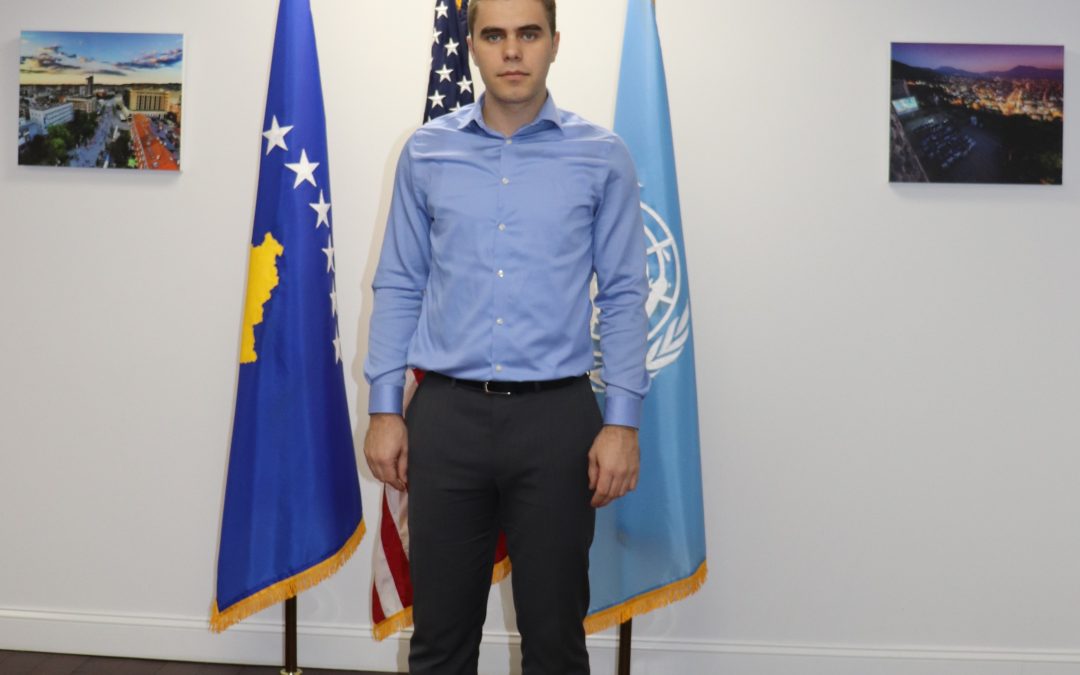
by Madison McHugh | Jan 24, 2018 | Graduate Students, Internship Experiences
My name is Lis Kabashi, and I am studying International Relations and Diplomacy at Seton Hall University. I come from a city called Mitrovica, which is located in the northern part of Kosovo.
I interned at the Consulate General of the Republic of Kosovo. In contrast to other Consulates, the Consulate General of Kosovo serves a dual purpose. Apart from serving its citizens in the US, the Consulate General also serves as a lobbying ‘mission’ to the UN, seeking more recognition for the Republic of Kosovo.
I decided to intern at the Consulate General of the Republic of Kosovo because in the future I would love to work as a diplomat for my country in one of our Embassies around the world. As the number of countries that recognizes Kosovo has gone up to 114, new Embassies and Consulates are opening up around the world. Thus, demand for experts in international relations and diplomacy has increased. For me, the experience at the Consulate General is a very important first step towards that goal.
My intern duties at the Consulate varied. For example, I prepared news analyses and reports on current events related to the Republic of Kosovo. Such analyses and reports served the purpose of informing the Ministry of Foreign Affairs in Kosovo.
During the UN General Assembly 2017, the Consulate received two High-Level Delegations: Presidential and the Ministry of Foreign Affairs. Along with another intern, I led the efforts in putting together files for each meeting that took place. These files, intended for the Chief of Cabinet for each delegation, consisted of brief biographies and resumes of each High-Level leader. Since most of our classes at the School of Diplomacy require us to learn about foreign policy decision makers from countries all over the world, I think that this is one of many ways how my internship related to my classes at the School of Diplomacy.
The opportunity to work at the Consulate was not only a period in which I learned about diplomacy – it was instrumental in building my professional network. Over two months, I had the honor of meeting Ambassadors and diplomats from various countries and attending functions hosted by different missions at the UN. Almost all of the diplomats that I met shared some of their experience and knowledge with me. Thus, I have learned how to think as a diplomat as well as how leaders protect the interests of their countries.
I recommend the internship to those who are interested in having a career in diplomacy. Apart from meeting key decision makers from all over the world, an intern at a Consulate could also improve their written and verbal communication skills, which are key to becoming a successful diplomat.
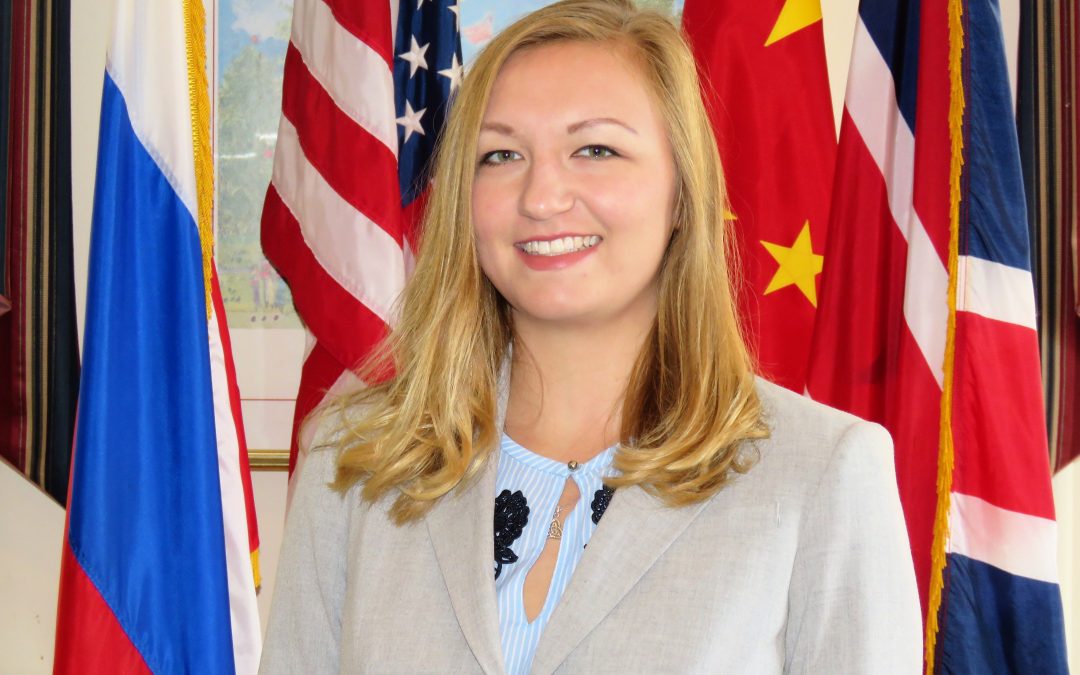
by Madison McHugh | Dec 13, 2017 | Internship Experiences, Undergraduate Students
My name is Lindsay Smetanka, and I am a senior at Seton Hall University majoring in Diplomacy and International Relations with minors in Arabic and Catholic Studies. I worked at International Crisis Group in New York City as a Government and Foundation Relations Intern. International Crisis Group is an independent, non-profit, non-governmental organization committed to preventing and resolving deadly conflict. Through field analysis, field advocacy, and policy suggestions, Crisis Group directly handles crisis and educates decision makers on future steps to resolve conflict happening throughout the world.
My day-to-day activities included tracking grant obligation outputs (advocacy meetings, reports, and briefings), working on database management projects, engaging with donors, and researching donor prospects. I was most interested in advancing Crisis Group’s monitoring and evaluation method to accurately measure the impact that the NGO’s outputs have in the international system, especially in areas experiencing crisis. With the rise of social media and technology, international NGO’s need to advance as well by using these methods to track who is viewing their content, where and if it is making the impact originally proposed, and how to improve engagement with donors and stakeholders. My coursework prepared me to think critically, write concise briefs, and meet deadlines. I learned how the grant-writing process works and how to communicate with professional contacts.
I believe that my internship has assisted in my goal to obtain a position as a development officer after graduation. Many jobs in the field require applicants to have experience with prospect research, Raiser’s Edge, donor engagement, and project management – all of the skills that I gained at Crisis Group. In addition, the internship exposed me to networking events and seminars in the city that helped me understand the non-profit development field better. As my first “big city” internship, it was definitely intimidating at times. The biggest challenge I faced as an intern was feeling like a small fish in a big ocean. When I first started, I doubted my qualifications, but after spending more time around my coworkers and the office culture, I became more comfortable and confident.
Some advice I can offer is that asking questions is an integral part of an internship, whether asking experienced professionals about their education and job history or asking coworkers about administrative processes. I gained knowledge through asking about something that I did not know or fully understand. In addition, networking in the office is essential to making the most out of the experience. Talking to coworkers on coffee and lunch breaks can open up new opportunities and help create working friendships. It also helps create a team mentality within the office, which is so crucial in a non-profit organization. I always left the office feeling confident that I helped advance the Crisis Group’s administrative process and mission. This feeling was the most rewarding part of my internship. I would definitely recommend this internship to my peers, as well as additional internship positions within Crisis Group.

by Madison McHugh | Nov 29, 2017 | Graduate Students, Internship Experiences
My name is Marissa Hutton, and I am currently a second year graduate student completing a dual degree in Diplomacy and International Relations and Strategic Communication. During the summer of 2017, I interned at an international communications firm, BLJ Worldwide in New York City. Daily responsibilities varied, but over the course of a week, I would typically produce memos on a variety of topics, create and manage databases of contacts and edit different pieces of writing.
The great thing about BLJ is that it was rare for interns to be tied down to a single project all day. The firm’s numerous clients meant that interns completed multiple tasks in a day and utilized different skill sets to assist the account managers. Even the smallest task of gathering contact information could become a springboard for an account manager to set up vital meetings for clients that could have long-term effects on their business. That was one of my favorite parts of being in the office: no job was too small and everyone appreciated the work done for them.
In terms of diplomacy, my internship required that I write, analyze, and conduct research on multiple current events each day. Our work tended to focus on diplomatic hot spots and areas that are sources of much discussion and analysis for a diplomacy student. Each day, interns ventured into Google News to pull any media mentions in order to create a report that illustrated the “public mood” in a 24-hour period. Due to international events at the time, some clients received an extensive amount of coverage, which then required me to conduct research on the media outlets and institutions discussing them, a process that exposed me to important influencers in the media and academia.
I also found that a large number of the case studies I was asked to analyze in my courses help me complete tasks in my internship. In my communications courses, these studies gave me a bank of examples to look back upon and draw new conclusions from, whereas in my diplomacy courses, the case studies provided me with important background information and policy analyses that I drew upon in writing memos for clients on diplomatic matters and institutions.
In terms of my career choice, this internship provided me with an answer to that ever-looming question: is this really what I want to do with my life? Thankfully, that answer was a resounding yes. My elders always said that if you are able to find enjoyment in all aspects of your career, then you never truly ‘work’ a day in your life. That is what I discovered about myself through my work at BLJ. I sincerely enjoyed everything from media monitoring to editing to the endless amounts of reading required to stay on top of the game. While my past internship experiences provided me with professional skills and knowledge, this one gave me much more: experiential confirmation that I made the right choice.
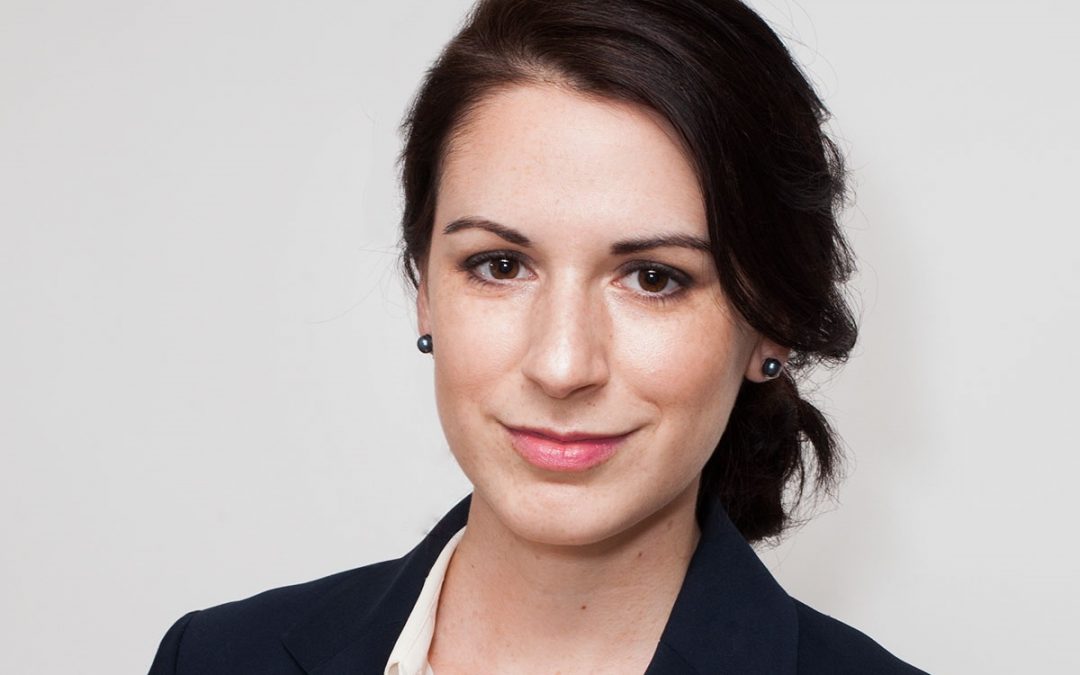
by Catherine Ruby | Jun 6, 2017 | Graduate Students, Internship Experiences
Emily Fox, M.A. May 2017
Carnegie Council on Ethics in International Affairs Internship
This spring, I had the opportunity to intern with the Carnegie Council on Ethics in International Affairs (EIA). I worked for Ethics & International Affairs, a journal publishing articles on current normative and ethical issues in foreign policy and international relations. One of my duties as an Editorial Intern was to act as the first point of assessment for all incoming submissions. In order to succeed at this task, I needed to have not only a strong theoretical background, but also a degree of familiarity with a wide array of current events. Thankfully, the School of Diplomacy has prepared me for these topics.
One of the most prominent debates in international relations ethics regards the policy and principle of the Responsibility to Protect, and many of the submissions I reviewed dealt with this topic. The knowledge I gained at the School’s United Nations Summer Intensive course was incredibly valuable for formulating assessments of these articles. Being able to hear firsthand from experts such as Hugh Dugan and Ed Luck really strengthened my background on the complexity of these issues and the opportunities and constraints the UN must navigate.
My skills in writing and editorial judgement were strengthened considerably by this internship, and I expanded my knowledge of international affairs by reading articles and essays by scholars. I learned a great deal about publishing and the peer-review process, and am able to participate and contribute in high-level meetings. Though I was lucky to have several years of professional experience prior to being hired at EIA, I have found that each professional environment teaches me something new about organization, communication, and workflow.
Should I choose to pursue a career as an editor, I will be prepared as my internship with EIA taught me a great deal about the requirements and challenges in the field, and has shown me the best practices for working through different stages of publication. As an intern, I often juggled several projects at once. My team at EIA was ready to provide guidance on prioritization and organization, which allowed me to complete my tasks efficiently without sacrificing quality.
The assignment I was most excited to complete at EIA was my book review. Each intern is invited to contribute a short review of a book of their choice for publication online and in the print journal. Because I could choose my book, I was able to pick something in an area in which I am interested. Not only was I able to read a book that interested me, but I also gained valuable writing experience from the exercise.
During my time at the internship, I tried to incorporate feedback whenever possible and volunteered for additional work when able. While I still have many opportunities for improvement, I think that applying these principles helped me to be successful thus far.
I would highly recommend my internship to others. The Carnegie Council is an excellent institution and a great place to be connected to. My coworkers have made me feel like a true member of the team, and their advice and guidance has been incredibly helpful for my professional development.








